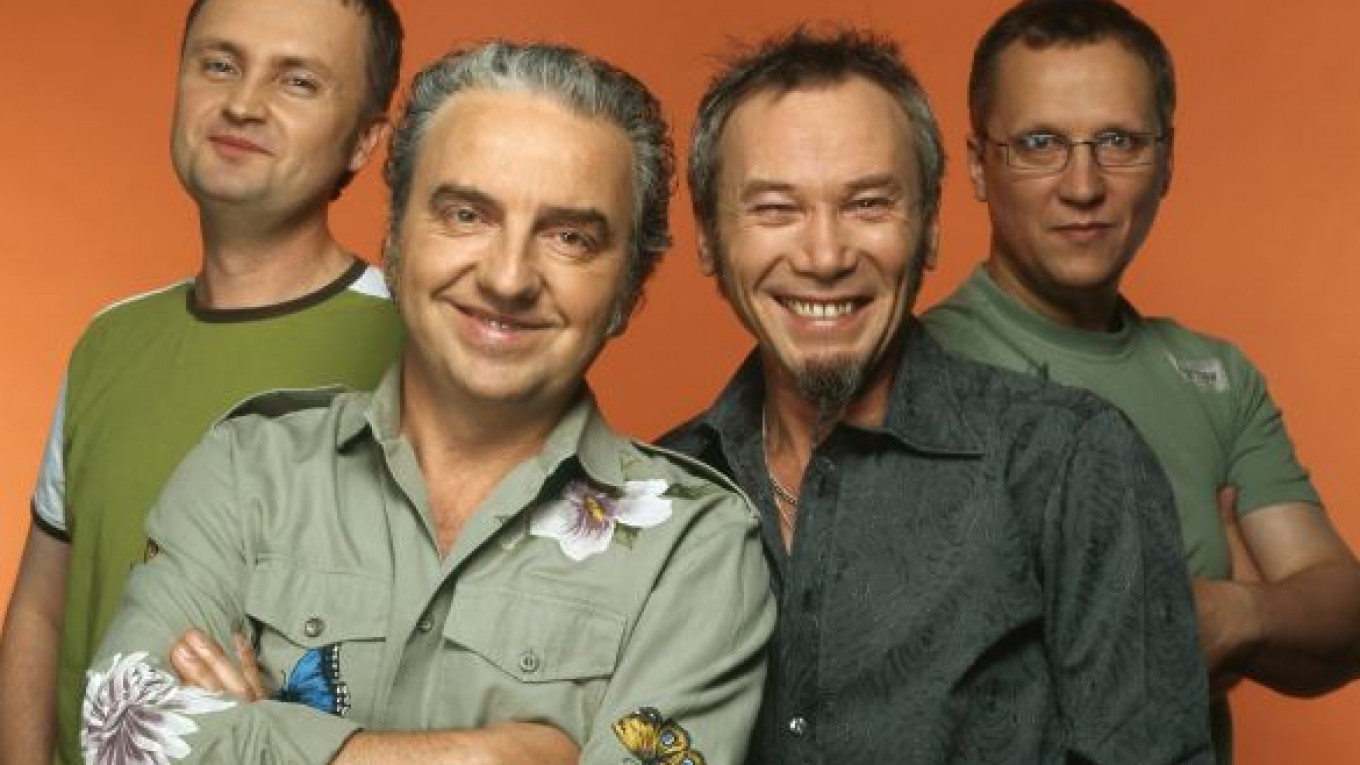Vladimir Shakhrin, the lead singer of Chaif, one of the country's best-known bands, was a construction worker in the 1980s in Sverdlovsk when the band was formed.
Over the years, Shakhrin, called the "Urals Bob Dylan" when discovered by a local music critic, and his group have managed to remain close to their roots, never leaving their hometown and writing songs that continue to capture moments and become favorites all over the country.
The name of the group combines two words, chai, meaning tea, and kaif, a slang word for a high, a kick or a thrill.
"It was the beginning of show business, but as simple boys from Urals we understood the show side but didn't understand the business side," said Shakhrin, remembering the early 1990s, when the group first began to become famous outside their native city, which had already been renamed Yekaterinburg.
He was speaking to The Moscow Times on the eve of a Moscow concert Friday dedicated to the 20th anniversary of one of their most famous recordings, "Deti Gor," or "Children of the Mountains." The album, released in 1992, was the first professional recording of the group and contains some of its most famous hits, such as "Ne Speshi" or "Don't Hurry."
The album was recorded at the Stas Namin studio on equipment that was donated by legendary singer Frank Zappa.
One of the group's most famous, if somewhat bizarre, hits was a reggae-inspired song about Jamaica losing 5-0 to Argentina in the World Cup. The song's rhyming chorus, "Kakaya bol, kakaya bol, Argentina, Yamaika, 5-0," brought Chaif much fame and a videocassette from the Jamaican Embassy showing the national team's better moments.
Almost 30 years later, the four-member group continues to tour and release new albums. Vladimir Begunov, the lead guitarist, has also been in the group since the start. The other two, Valery Severin and Vyacheslav Dvinin, joined Chaif in the late 1980s and early 1990s, respectively.
Unlike many Russian groups, Chaif has never shown much willingness to talk politics, although the band did campaign for Boris Yeltsin during his 1996 presidential run.
Shakhrin did serve as a regional lawmaker in the 1980s, when Soviet practice often saw workers picked and forced to serve in parliament. He was not enamored by the experience and remembers how everything was controlled.
"I was really shocked when I was given a bill with amendments already put in the text," he said, which meant lawmakers were left with nothing to do.
Chaif's songs are not political but the group tries to provide another side to what is happening in the country, he said.
"I don't believe in an absolute democracy, but I know that love is more important than hate, and hate is heavy on the scales right now," Shakhrin said. "I want to put something on the other side."
Chaif plays on Friday. Arena Moscow Club. 31 Leningradsky Prospekt, Building 4. Metro Dinamo.
Related articles:
A Message from The Moscow Times:
Dear readers,
We are facing unprecedented challenges. Russia's Prosecutor General's Office has designated The Moscow Times as an "undesirable" organization, criminalizing our work and putting our staff at risk of prosecution. This follows our earlier unjust labeling as a "foreign agent."
These actions are direct attempts to silence independent journalism in Russia. The authorities claim our work "discredits the decisions of the Russian leadership." We see things differently: we strive to provide accurate, unbiased reporting on Russia.
We, the journalists of The Moscow Times, refuse to be silenced. But to continue our work, we need your help.
Your support, no matter how small, makes a world of difference. If you can, please support us monthly starting from just $2. It's quick to set up, and every contribution makes a significant impact.
By supporting The Moscow Times, you're defending open, independent journalism in the face of repression. Thank you for standing with us.
Remind me later.






